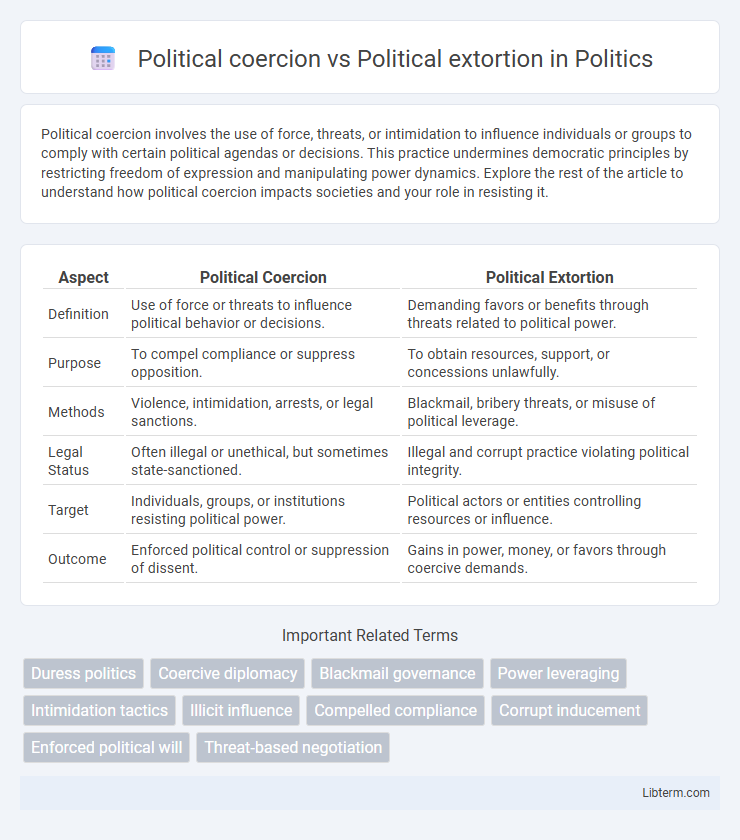Political coercion involves the use of force, threats, or intimidation to influence individuals or groups to comply with certain political agendas or decisions. This practice undermines democratic principles by restricting freedom of expression and manipulating power dynamics. Explore the rest of the article to understand how political coercion impacts societies and your role in resisting it.
Table of Comparison
| Aspect | Political Coercion | Political Extortion |
|---|---|---|
| Definition | Use of force or threats to influence political behavior or decisions. | Demanding favors or benefits through threats related to political power. |
| Purpose | To compel compliance or suppress opposition. | To obtain resources, support, or concessions unlawfully. |
| Methods | Violence, intimidation, arrests, or legal sanctions. | Blackmail, bribery threats, or misuse of political leverage. |
| Legal Status | Often illegal or unethical, but sometimes state-sanctioned. | Illegal and corrupt practice violating political integrity. |
| Target | Individuals, groups, or institutions resisting political power. | Political actors or entities controlling resources or influence. |
| Outcome | Enforced political control or suppression of dissent. | Gains in power, money, or favors through coercive demands. |
Defining Political Coercion
Political coercion involves the use of force, threats, or intimidation by a government or political entity to influence or control individuals' actions and decisions. It often targets citizens or opposition groups to suppress dissent and maintain power through fear or repression. Distinct from political extortion, which centers on obtaining benefits through threats or manipulation, political coercion emphasizes the enforcement of compliance and obedience to authority.
Understanding Political Extortion
Political extortion involves the use of threats or force to obtain money, services, or concessions from individuals or organizations, often exploiting political power or influence. Unlike political coercion, which pressures individuals to act in certain ways under political influence, political extortion specifically targets tangible benefits through intimidation or blackmail. Understanding political extortion highlights its role in undermining governance and eroding trust within political systems by promoting corruption and abuse of power.
Key Differences Between Coercion and Extortion
Political coercion involves the use of force or threats to influence political actions or decisions without direct personal gain, emphasizing control and compliance over political power. Political extortion specifically entails obtaining money, property, or political favors through threats or intimidation, highlighting the pursuit of personal or group benefit. The key difference lies in coercion's focus on political influence and extortion's focus on material or political gain through threats.
Historical Examples of Political Coercion
Historical examples of political coercion include the use of authoritarian regimes to suppress dissent and control populations, such as Stalin's purges in the Soviet Union and the Cultural Revolution in China under Mao Zedong. These actions often involved threats, imprisonment, and violence to force compliance with the ruling party's ideology. Political coercion differs from extortion by focusing on enforcing political power rather than seeking personal or financial gain through demands.
Notable Cases of Political Extortion
Notable cases of political extortion include the Watergate scandal, where the Nixon administration used illicit means to pressure opponents and secure political advantage, exposing the misuse of power for personal gain. Another prominent example is the Rod Blagojevich case, in which the Illinois governor attempted to sell Barack Obama's vacant Senate seat for personal favors, highlighting corruption in political appointments. These instances reveal how political extortion undermines democratic institutions by leveraging threats or demands for economic or political benefits.
Psychological Impact on Victims and Society
Political coercion exerts psychological pressure on victims through fear, anxiety, and helplessness, undermining autonomy and trust in institutions. Political extortion multiplies trauma by exploiting victims' vulnerabilities for personal or group gain, fostering widespread societal distrust and cynicism. Both forms erode social cohesion and mental well-being, destabilizing democratic processes and civic engagement.
Legal Frameworks and Consequences
Political coercion involves using threats or force to influence political behavior, often addressed under laws against intimidation and abuse of power, with penalties ranging from fines to imprisonment. Political extortion specifically requires obtaining money, property, or services through threats, and is prosecuted under statutes targeting corruption and bribery, carrying severe sanctions including felony charges. Legal frameworks differentiate these offenses by intent and means, with courts imposing consequences that reflect the severity of undermining democratic processes and public trust.
Detecting and Preventing Political Manipulation
Political coercion involves using threats or force to influence political decisions, while political extortion relies on exploiting information or leverage for political gain. Detecting these manipulations requires monitoring unusual patterns in political financing, communications, and policymaking processes using advanced data analytics and transparency initiatives. Preventing political manipulation entails enforcing strict anti-corruption laws, enhancing whistleblower protections, and promoting public awareness through education and independent media scrutiny.
Global Perspectives and Cross-Cultural Comparisons
Political coercion involves the use of force or threats by governments or political entities to influence behavior or decisions, often justified for maintaining order or security, whereas political extortion specifically entails leveraging threats or corrupt practices to extract resources or concessions, frequently for personal or group gain. Globally, authoritarian regimes exhibit high levels of political coercion, while political extortion is widespread in regions with weak institutional governance and endemic corruption, such as parts of Sub-Saharan Africa and Southeast Asia. Cross-cultural comparisons reveal that societal tolerance toward political coercion and extortion varies significantly, influenced by historical context, legal frameworks, and the strength of civil society institutions.
Future Trends in Political Power Abuse
Political coercion and political extortion increasingly exploit digital surveillance and AI-driven data analytics to manipulate behavior and suppress dissent, signaling a shift in power abuse tactics. Emerging technologies enable state actors to implement predictive policing and social credit systems, intensifying control mechanisms while evading traditional legal frameworks. Future trends suggest a convergence of cyber-psychological operations and economic pressure tools, complicating detection and resistance efforts globally.
Political coercion Infographic

 libterm.com
libterm.com